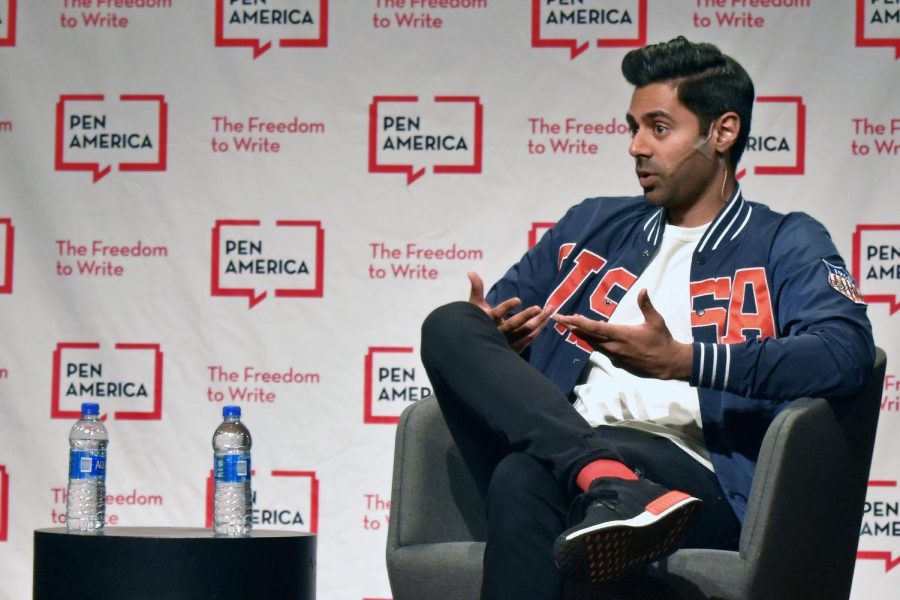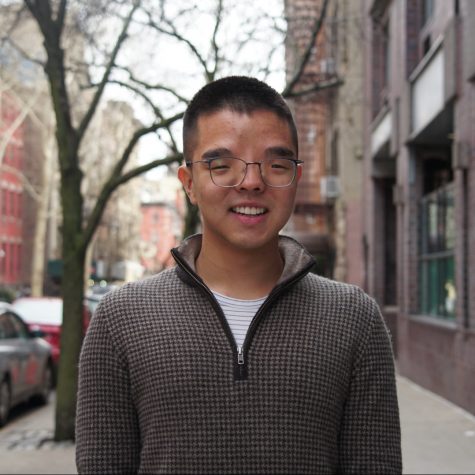Hasan Minhaj Talks Muslim Community and the Hustle at PEN World Voices
Hasan Minhaj at the PEN World Voices Festival on April 22. Minhaj discussed his comedy and being Muslim in the era of President Donald Trump.
April 24, 2018
When Wajahat Ali asked how Hasan Minhaj persuades the “modern whites,” or the white gatekeepers of the entertainment industry, to fund his projects, Minhaj explained the necessary audacity to believe in one’s projects.
Minhaj’s optimistic mentality fuels his hustle. Minhaj, comedian and senior correspondent for “The Daily Show with Trevor Noah,” sat down with journalist and award-winning playwright Ali at the PEN World Voices Festival on Sunday to discuss comedy and being Muslim in the era of President Donald Trump.
“To me, I’m playing offense,” Minhaj said. “I’m not asking for your permission; I’m asking for your support. The check is already clear. I already paid for the publicist. It’s happening. Every artist you love thinks they’re an anomaly. Kanye thinks he’s an anomaly. All these guys think that they’re going to make it happen, so they act like it. So my advice is to recognize the dollars behind your work.”
Ali stole the show with his comedic mediation, jokes and ongoing banter with Minhaj as they reflected on Minhaj’s success and his position as a visible member of the Muslim community. Minhaj joked that for his Pizza Hut commercial to promote his 2017 Netflix special “Hasan Minhaj: Homecoming King,” he made sure he wasn’t displaying pork, a prohibited food in Islam, to “keep it halal” for the Muslims that would watch the commercial. Minhaj’s small yet significant detail in his commercial reflects his awareness throughout his successful career.
Minhaj mentioned that when he started doing stand-up, he knew it was a risky career path in comparison to the traditional immigrant perspective of success –– becoming a doctor, lawyer or engineer. So when Minhaj’s father came around to fully support him, Minhaj described his utmost gratitude.
“It’s like having Mufasa be proud of you, to raise you,” Minhaj said. “I feel lucky to have my father be old enough to see my success. My dad — he’s really funny, but every desi uncle doesn’t want to be made fun of, but he’s willing to accept a lot of jokes and be openly made fun of. And I give him a lot of respect, because he sees the bigger message that I’m trying to do in my comedy specials and things. He’s able to see himself as more than a punchline.”
Minhaj furthered by shedding light on the tougher circumstances that Muslim women face and by urging a need for their stories. The audience roared in affirmation, and Fordham junior Amira explained what Minhaj’s talk meant for her.
“Wajahat and Hasan are both very funny people, and I was able to see Muslims have a voice, especially in our society and our age,” Amira said. “It was very inspiring. It was extremely important to hear [Minhaj] talk about Muslim women because it is something that we would all like to hear today as brown women. Brown Muslim women have a lot of potential, and I’m very excited for these upcoming years.”
Ali and Minhaj’s banter and discussion filled with jokes and scenarios only those in the Muslim and South Asian community would understand. They gave comedic and personal voice to the audience as well as hope for young artists to believe in their stories and their work now more than ever.
Email Joel Lee at [email protected].

























































































































































